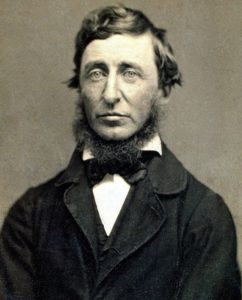An Introvert’s Field Guide to Friendship: Thoreau on the Challenges and Rewards of the Art of Connection
INSPIRATIONAL, 17 Apr 2023
Maria Popova | The Marginalian – TRANSCEND Media Service
“We only need to be as true to others as we are to ourselves that there may be ground enough for friendship.”
Friendship is the sunshine of life — the quiet radiance that makes our lives not only livable but worth living. (This is why we must use the utmost care in how we wield the word friend.) In my own life, friendship has been the lifeline for my darkest hours of despair, the magnifying lens for my brightest joys, the quiet pulse-beat beneath the daily task of living. You can glean a great deal about a person from the constellation of friends around the gravitational pull of their personhood. “Whatever our degree of friends may be, we come more under their influence than we are aware,” the trailblazing astronomer Maria Mitchell observed as she contemplated how we co-create each other and recreate ourselves in friendship. Her friend Ralph Waldo Emerson — whom she taught to look through a telescope — believed that all true friendship rests on two pillars. In his own life, he put the theory into practice in his friendship with his young protégé Henry David Thoreau (July 12, 1817–May 6, 1862) — a solitary and achingly introverted person himself, who thought deeply and passionately about the rewards and challenges of friendship.
Like all unusual people, Thoreau had a hard time connecting. In a desponded diary entry from his mid-thirties, found in The Journal of Henry David Thoreau, 1837–1861 (public library), he writes:
Why should I speak to my friends? for how rarely is it that I am I; and are they, then, they? We will meet, then, far away.
Several months later, just before the Christmas holidays with their cruel magnifying lens of loneliness for the lonely, he rues his inability to connect openheartedly:
My difficulties with my friends are such as no frankness will settle. There is no precept in the New Testament that will assist me. My nature, it may be, is secret. Others can confess and explain; I cannot.
Thoreau finds himself pocked with self-doubt about his ability to connect, his sense of isolation at times swelling into punitive despair:
Nothing makes me so dejected as to have met my friends, for they make me doubt if it is possible to have any friends. I feel what a fool I am.
Over and over, Thoreau anguishes with the extreme shyness and reticence of his nature, longs for a confidante beyond the diary page, longs for companionship beyond the birds and the trees. On a beautiful spring Sunday, he despairs:
I have got to that pass with my friend that our words do not pass with each other for what they are worth. We speak in vain; there is none to hear. He finds fault with me that I walk alone, when I pine for want of a companion; that I commit my thoughts to a diary even on my walks, instead of seeking to share them generously with a friend; curses my practice even. Awful as it is to contemplate, I pray that, if I am the cold intellectual skeptic whom he rebukes, his curse may take effect, and wither and dry up those sources of my life, and my journal no longer yield me pleasure nor life.
Months after publishing Walden, with its lyrical celebration of solitude, his loneliness deepens into a primal scream of longing for connection:
What if we feel a yearning to which no breast answers? I walk alone. My heart is full. Feelings impede the current of my thoughts. I knock on the earth for my friend. I expect to meet him at every turn; but no friend appears, and perhaps none is dreaming of me.
And yet this openhearted longing is itself the only real raw material of friendship — only by surrendering to it, with all the vulnerability this demands of us, do we become receptive to the longing of others, the mutual yearning for connection that is shared heartbeat of humanity. Thoreau quietly intuits this equivalence, so that when he does connect, when he does feel the warm glow of friendship envelop him, it is nothing less than an exultation:
Ah, my friends, I know you better than you think, and love you better, too.

At only twenty-four, Thoreau had arrived at a foundational fact of living — his own grand unified theory of human connection, which he spent the remainder of his short life trying, often with touching difficulty, to put into practice:
Friends are those twain who feel their interests to be one. Each knows that the other might as well have said what he said. All beauty, all music, all delight springs from apparent dualism but real unity. My friend is my real brother.
Pulsating beneath all of his uneasy reckonings is a deep-thinking, deep-feeling recognition of the essence of friendship:
The field where friends have met is consecrated forever. Man seeks friendship out of the desire to realize a home here… The friend is like wax in the rays that fall from our own hearts. My friend does not take my word for anything, but he takes me. He trusts me as I trust myself. We only need to be as true to others as we are to ourselves that there may be ground enough for friendship.

Complement these fragments from The Journal of Henry David Thoreau — a biblical kind of book, replete with his deep-souled wisdom on how to see more clearly, the myth of productivity, the greatest gift of growing old, the sacredness of public libraries, the creative benefits of keeping a diary, and the only worthwhile definition of success — with Seneca on true and false friendship, Kahlil Gibran on the building blocks of meaningful connection, Henry Miller on the relationship between creativity and community, Lewis Thomas on the poetic science of why we are wired for connection, and this lovely vintage illustrated ode to friendship.
_______________________________________
 My name is Maria Popova — a reader, a wonderer, and a lover of reality who makes sense of the world and herself through the essential inner dialogue that is the act of writing. The Marginalian (which bore the unbearable name Brain Pickings for its first 15 years) is my one-woman labor of love, exploring what it means to live a decent, inspired, substantive life of purpose and gladness. Founded in 2006 as a weekly email to seven friends, eventually brought online and now included in the Library of Congress permanent web archive, it is a record of my own becoming as a person — intellectually, creatively, spiritually, poetically — drawn from my extended marginalia on the search for meaning across literature, science, art, philosophy, and the various other tendrils of human thought and feeling. A private inquiry irradiated by the ultimate question, the great quickening of wonderment that binds us all: What is all this? (More…)
My name is Maria Popova — a reader, a wonderer, and a lover of reality who makes sense of the world and herself through the essential inner dialogue that is the act of writing. The Marginalian (which bore the unbearable name Brain Pickings for its first 15 years) is my one-woman labor of love, exploring what it means to live a decent, inspired, substantive life of purpose and gladness. Founded in 2006 as a weekly email to seven friends, eventually brought online and now included in the Library of Congress permanent web archive, it is a record of my own becoming as a person — intellectually, creatively, spiritually, poetically — drawn from my extended marginalia on the search for meaning across literature, science, art, philosophy, and the various other tendrils of human thought and feeling. A private inquiry irradiated by the ultimate question, the great quickening of wonderment that binds us all: What is all this? (More…)
Go to Original – themarginalian.org
Tags: Communication, Henry David Thoreau, Inspirational, Wisdom
DISCLAIMER: The statements, views and opinions expressed in pieces republished here are solely those of the authors and do not necessarily represent those of TMS. In accordance with title 17 U.S.C. section 107, this material is distributed without profit to those who have expressed a prior interest in receiving the included information for research and educational purposes. TMS has no affiliation whatsoever with the originator of this article nor is TMS endorsed or sponsored by the originator. “GO TO ORIGINAL” links are provided as a convenience to our readers and allow for verification of authenticity. However, as originating pages are often updated by their originating host sites, the versions posted may not match the versions our readers view when clicking the “GO TO ORIGINAL” links. This site contains copyrighted material the use of which has not always been specifically authorized by the copyright owner. We are making such material available in our efforts to advance understanding of environmental, political, human rights, economic, democracy, scientific, and social justice issues, etc. We believe this constitutes a ‘fair use’ of any such copyrighted material as provided for in section 107 of the US Copyright Law. In accordance with Title 17 U.S.C. Section 107, the material on this site is distributed without profit to those who have expressed a prior interest in receiving the included information for research and educational purposes. For more information go to: http://www.law.cornell.edu/uscode/17/107.shtml. If you wish to use copyrighted material from this site for purposes of your own that go beyond ‘fair use’, you must obtain permission from the copyright owner.
